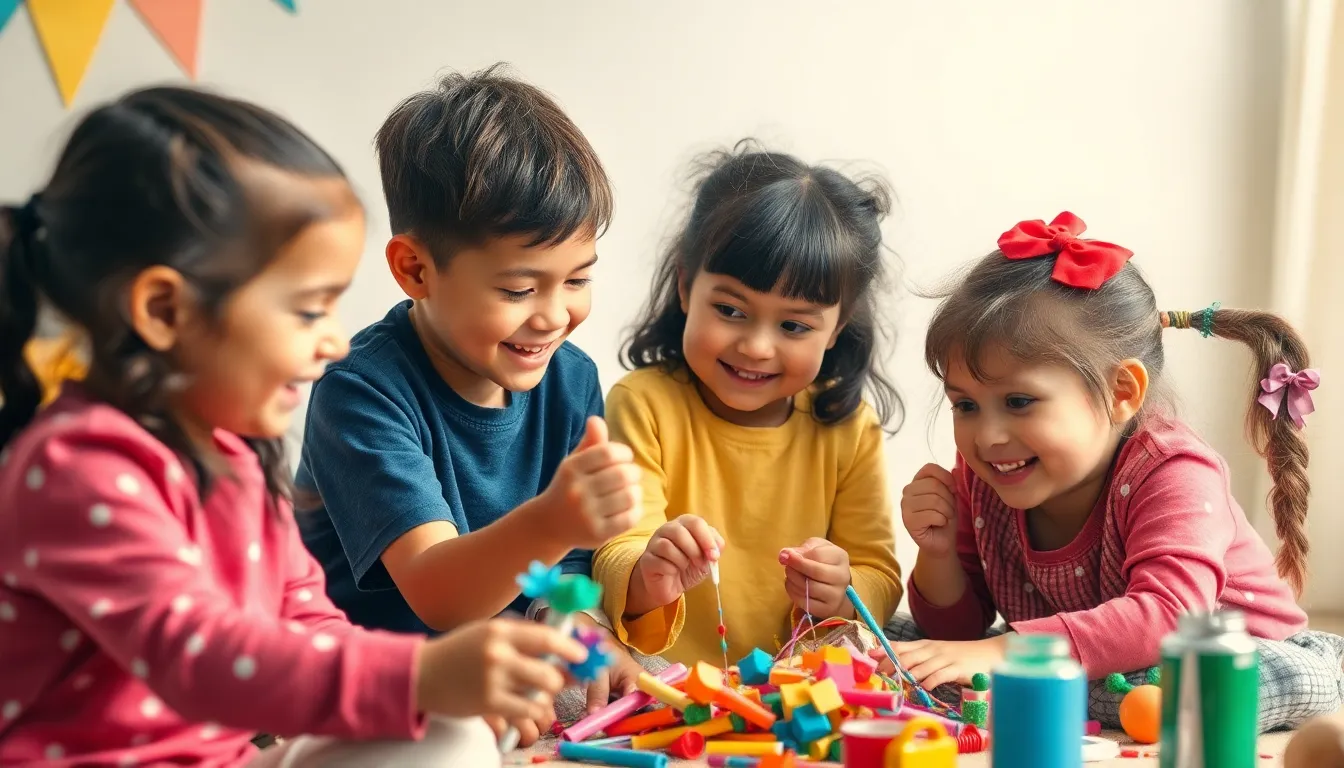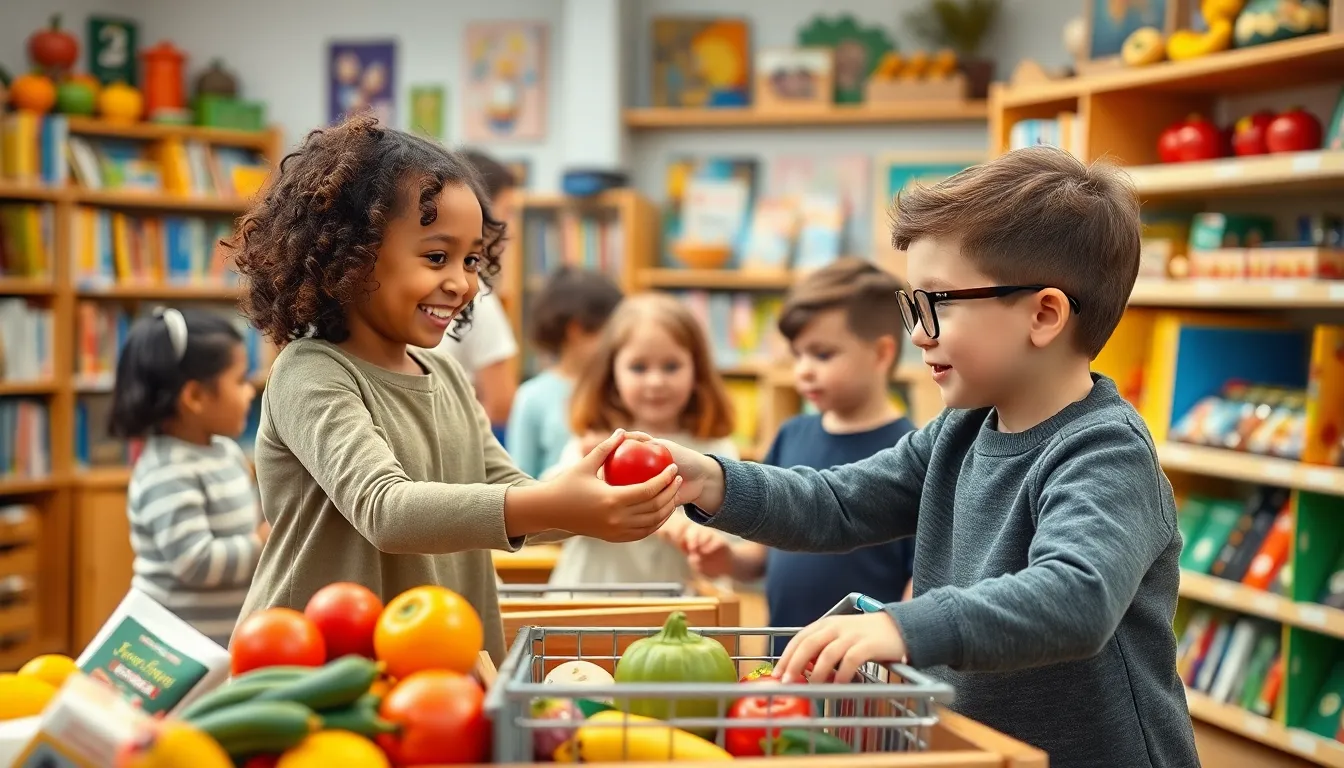Imagine a world where playtime isn’t just about toys and games but a vibrant playground for language development. Language-focused playtime transforms ordinary moments into extraordinary opportunities for kids to explore words, sounds, and stories. It’s like giving their brains a workout while they’re having the time of their lives—who knew learning could be this much fun?
In this article, we’ll dive into the magic of language-focused playtime, showcasing how it helps children build communication skills, boosts creativity, and even strengthens social bonds. So, grab a snack and get comfy—you’re about to discover how a little playful chatter can lead to big leaps in language skills. After all, who wouldn’t want to turn giggles into grammar?
Table of Contents
ToggleWhat Is Language-Focused Playtime?
Language-focused playtime refers to interactive activities designed to enhance children’s language skills through playful engagement. This approach transforms ordinary play into a rich environment where children can explore words, sounds, and stories. During these activities, children practice vocabulary, develop narrative skills, and improve comprehension abilities.
Creative games like storytelling sessions or word-based challenges encourage children to express themselves freely. They gain confidence with every new word they learn and use. Additionally, cooperative play fosters communication and collaboration among peers, leading to stronger social connections.
Roles in play scenarios allow children to experiment with language in context. For example, in a pretend grocery store, they can use relevant vocabulary while asking questions or making choices. This hands-on experience provides practical language usage that aligns with real-life situations.
Furthermore, language-focused playtime caters to different learning styles. Visual learners benefit from illustrated storybooks, while auditory learners thrive in rhyming games or songs. Each child can find joy and motivation in diverse activities, promoting individualized learning paths.
In short, language-focused playtime encompasses various dynamic strategies to develop essential language skills. Engaging in these activities enriches children’s learning experiences, making language acquisition both enjoyable and effective.
Benefits of Language-Focused Playtime

Language-focused playtime offers multiple advantages for children’s development. Engaging in these playful activities fosters essential language skills in an enjoyable setting.
Enhancing Communication Skills
Communication skills see improvement during language-focused playtime. Children practice expressing thoughts and feelings through interactive games. Activities like storytelling or role-playing scenarios present opportunities for sharing ideas. This practice boosts vocabulary and aids in the understanding of sentence structure. Conversations with peers enhance listening skills as well, allowing for back-and-forth exchanges. Role-play, such as acting out different characters, provides context for using new words, improving confidence in communication. Success in these areas contributes to children’s ability to articulate needs, leading to stronger relationships with others.
Encouraging Creativity and Imagination
Creativity flourishes within language-focused playtime settings. Imaginative play encourages children to invent stories and scenarios, promoting original thought. For example, using props to create dramatic scenes allows for exploration of various roles and perspectives. Such activities engage children’s minds and stimulate language use in innovative ways. Crafting stories together encourages collaborative creativity, fostering teamwork. Language-rich environments inspire curiosity, leading to exploration of new concepts and ideas. Children reflect on their surroundings, translating experiences into creative expression. Overall, these interactive experiences nourish imagination while supporting language development.
Activities for Language-Focused Playtime
Engaging in activities designed for language development can significantly enhance a child’s communication skills. This section outlines effective playtime activities that promote language growth.
Storytelling and Role-Playing
Storytelling captivates children’s imagination and encourages verbal expression. Children narrate tales using their own words, which aids vocabulary expansion. Role-playing scenarios, such as being a doctor or teacher, provide context where children practice language in realistic settings. They experiment with dialogue, enhancing their conversational skills during play. Encouraging group storytelling promotes collaborative thinking and helps children listen and respond to others, fostering social skills. Such scenarios allow for exploration of emotions, expanding their understanding of language’s expressive power.
Word Games and Puzzles
Word games create excitement while supporting language mastery. Games like Scrabble or Boggle challenge children to form words, reinforcing spelling and vocabulary. Crossword puzzles stimulate critical thinking and comprehension, enhancing word recognition. Finding hidden words in word searches promotes attention to detail and pattern recognition. These activities encourage teamwork, as children can work with peers to complete challenges, leading to improved communication skills. Incorporating rhyme games can further develop phonemic awareness, making learning fun and engaging.
Tips for Parents and Educators
Enhancing children’s language skills through playtime requires specific strategies and interactions. Parents and educators can employ these tips to create a vibrant language-focused environment.
Creating a Language-Rich Environment
Establish a setting filled with diverse books and visual aids. Words should be visible throughout the space, incorporating labels for common items. Utilize interactive materials like flashcards and word games to make learning engaging. Encourage conversations on various topics to expose children to new vocabulary. Introduce songs and rhymes regularly, showcasing rhythm and language patterns. Celebrate all forms of expression, fostering an atmosphere where ideas can flow freely. Make reading a group activity, inviting participation from all children. Provide feedback with enthusiasm when children use new words, reinforcing their efforts.
Engaging Children in Conversations
Encourage open-ended questions during interactions. Asking children about their day invites them to share experiences and practice language. Maintain eye contact and listen actively to show importance in what they say. Respond to their answers with follow-up questions, signaling that communication is valued. Share stories from your experiences, modeling narrative skills. Take turns in conversations, allowing children to explore dialogue dynamics. Use descriptive language to enrich discussions, helping children learn through context. Incorporate games that stimulate conversation, such as “20 Questions” or charades, promoting social language use.
Language-focused playtime offers a vibrant approach to nurturing children’s language skills. By integrating play with learning, children not only expand their vocabulary but also enhance their communication abilities. Engaging in creative activities fosters imagination and self-expression, making language acquisition an enjoyable experience.
Through interactive games and role-playing, children gain confidence and develop essential social connections. The benefits extend beyond language development, promoting teamwork and collaboration among peers. Parents and educators play a crucial role in creating an enriching environment that encourages exploration and conversation.
Embracing language-focused playtime can transform everyday moments into powerful learning opportunities, ensuring children thrive in their language journey.





